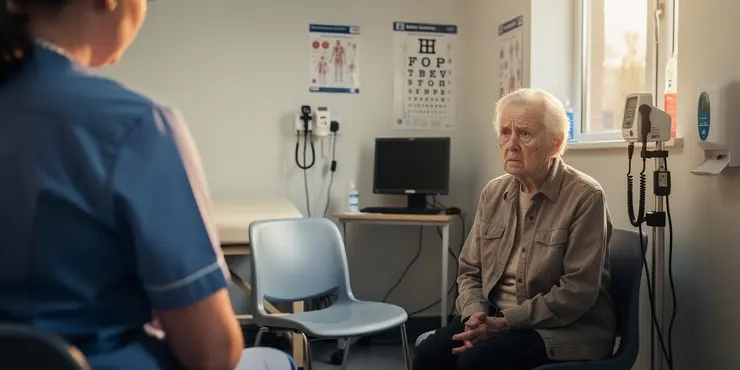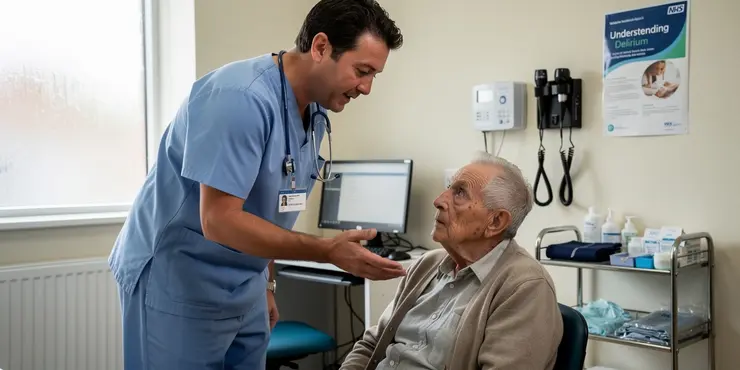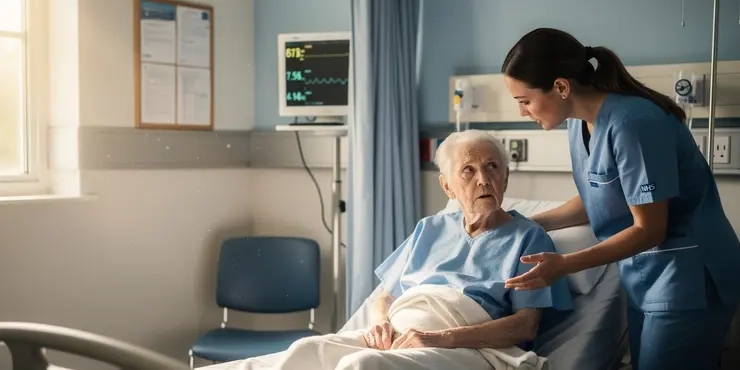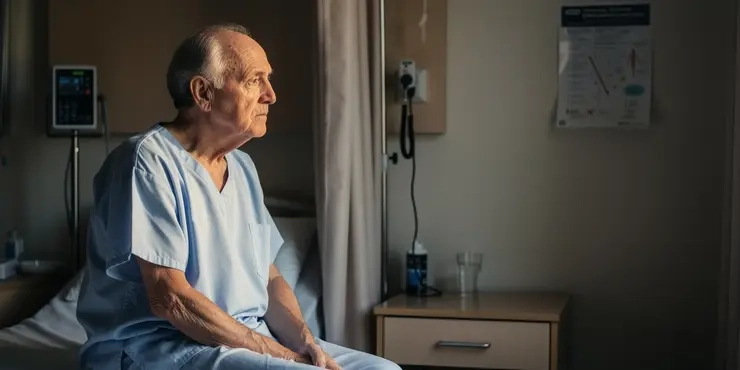Find Help
More Items From Ergsy search
-

Delirium
Relevance: 100%
-

What is Delirium
Relevance: 95%
-

What is delirium
Relevance: 94%
-

The Delirium Question on Patientrack
Relevance: 91%
-

Experiencing delirium after surgery
Relevance: 87%
-

How do you spot delirium
Relevance: 85%
-

Delirium: A Patient Story at Leicester's Hospitals
Relevance: 84%
-

How is ketamine used in veterinary medicine?
Relevance: 13%
-

Can binge drinking lead to addiction?
Relevance: 6%
-
How does binge drinking affect mental health?
Relevance: 5%
Understanding Delirium
What is Delirium?
Delirium is a serious and often sudden change in a person's cognitive functioning, commonly affecting attention, perception, and awareness. It can manifest through confusion, disorientation, and difficulty in concentrating, and can fluctuate in severity over a short period. Delirium is particularly prevalent among older adults and can occur in any healthcare setting, including hospitals and care homes.
Causes of Delirium
Several factors and underlying conditions can contribute to the onset of delirium. Common causes include infections such as urinary tract infections or pneumonia, dehydration, severe pain, surgery, and medications that affect the central nervous system. Chronic illnesses, alcohol or substance abuse, and withdrawal symptoms can also lead to delirium. Understanding and identifying the root causes is crucial for proper management and treatment.
Symptoms and Diagnosis
Symptoms of delirium can vary significantly but generally include impaired attention, memory disturbances, and confusion. Mood swings, restlessness, disturbed sleep patterns, and hallucinations are also possible. Diagnosing delirium typically involves a comprehensive assessment by a healthcare professional, including a review of medical history, physical examinations, and cognitive tests to distinguish delirium from other conditions like dementia.
Treatment and Management
The primary approach in treating delirium involves addressing its underlying causes. For example, treating infections with antibiotics or managing pain with appropriate medications. Supportive care, which includes maintaining a calm environment, ensuring proper hydration and nutrition, and involving family members, plays a significant role in recovery. In some cases, medications such as antipsychotics may be prescribed to manage severe agitation or psychotic symptoms, but these are used cautiously.
Delirium in the UK
In the United Kingdom, delirium is a significant concern, especially among the ageing population. The NHS highlights the importance of early detection and intervention to minimize the impact of delirium on patients and their families. Initiatives such as training healthcare providers in recognizing and managing delirium, promoting awareness, and implementing guidelines ensure that patients receive appropriate and timely care.
Preventing Delirium
Preventive measures for delirium include regular monitoring of patients at risk, managing pre-existing health conditions, and minimizing the use of medications that can trigger delirium. Ensuring proper sleep hygiene, hydration, and nutrition, along with cognitive engagement activities, can also mitigate the risk. Families and caregivers play a critical role in providing a familiar and reassuring environment for at-risk individuals.
Delirium is a medical emergency that requires prompt attention and care. By understanding its causes, symptoms, and treatment options, individuals and healthcare professionals can work together to improve outcomes for those affected.
Understanding Delirium
What is Delirium?
Delirium is a sudden change in how someone thinks. It makes it hard to pay attention or understand things. People might feel confused or mixed up. Delirium can get better or worse quickly, and it is common in older people. It can happen in hospitals or care homes.
Causes of Delirium
Many things can cause delirium. Some common causes are infections like a urinary tract infection or pneumonia, being dehydrated, having a lot of pain, having surgery, and certain medicines. Long-term illnesses, using too much alcohol or drugs, and withdrawal from these can also cause delirium. It is important to know what causes delirium so it can be treated properly.
Symptoms and Diagnosis
Delirium symptoms include having trouble paying attention, memory problems, and feeling confused. People might have mood changes, feel restless, not sleep well, or see things that are not there. Doctors find out if someone has delirium by looking at their health history, doing physical exams, and tests that check how they think.
Treatment and Management
The main way to treat delirium is to fix what is causing it. For example, treating infections with medicine or giving pain relief. It helps to have a calm place, make sure the person drinks enough water, eats well, and has family around. Sometimes doctors might give other medicines if the person is very upset or seeing things. But they are careful with these medicines.
Delirium in the UK
In the UK, delirium is a big worry, especially for older people. The NHS wants to spot and treat delirium early to help patients and their families. They train doctors and nurses to know what delirium is and how to help patients with it.
Preventing Delirium
To prevent delirium, it is important to check people who might get it, manage their health problems, and be careful with medicines that could cause it. Making sure people sleep well, drink enough, and eat well is important too. Doing activities that keep the brain active helps. Families and caregivers can help by being supportive and creating a calm environment.
Delirium is serious and needs quick care. By knowing what causes it, the symptoms, and how to treat it, people and doctors can work together to help those affected feel better.
Frequently Asked Questions
What is delirium?
Delirium is a serious disturbance in mental abilities that results in confused thinking and reduced awareness of the environment. It is often sudden and fluctuates in severity.
What are the common causes of delirium?
Common causes of delirium include infections, medication side effects, surgery, chronic illness, substance abuse or withdrawal, and significant changes in environment or routine.
Who is at risk for developing delirium?
Older adults, particularly those with dementia, are at higher risk. Other risk factors include severe illness, frailty, vision or hearing impairment, and a history of delirium.
How is delirium diagnosed?
Delirium is diagnosed based on medical history, a physical examination, cognitive testing, and sometimes additional diagnostic tests to identify underlying causes.
What are the main symptoms of delirium?
Symptoms of delirium can include sudden confusion, inability to stay focused, disorientation, memory issues, hallucinations, and changes in sleep patterns or alertness.
Can delirium be prevented?
While not all cases can be prevented, strategies like avoiding polypharmacy, maintaining a regular sleep pattern, staying hydrated, and providing sensory aids can help reduce the risk.
How long does delirium last?
The duration of delirium can vary, usually lasting from a few hours to several days, though recovery may take longer, especially in older adults.
What treatments are available for delirium?
Treatment focuses on addressing the underlying cause of delirium, providing supportive care, maintaining a quiet and calm environment, and sometimes using medications to manage severe symptoms.
Is delirium the same as dementia?
No, delirium and dementia are different conditions. Delirium occurs suddenly and fluctuates, while dementia is a chronic, progressive decline in cognitive function.
How can family members support a loved one with delirium?
Family members can support a loved one with delirium by providing reassurance, promoting a calm environment, encouraging hydration and nutrition, and keeping a consistent routine.
Can delirium lead to long-term complications?
Yes, delirium can lead to long-term complications, particularly in older adults, including an increased risk of dementia, prolonged recovery periods, and higher mortality rates.
Are there specific tests to determine the cause of delirium?
Tests to determine the cause of delirium may include blood tests, urine tests, brain imaging, and reviewing medications to identify potential triggers.
Is delirium common in hospitalised patients?
Yes, delirium is common in hospitalised patients, especially among older adults and those in intensive care units. It is often related to the illness, surgery, or medications.
What is the difference between hyperactive and hypoactive delirium?
Hyperactive delirium is characterised by restlessness, agitation, and aggression, while hypoactive delirium involves lethargy, drowsiness, and reduced responsiveness. Mixed delirium includes features of both.
Should I seek medical help if I suspect someone has delirium?
Yes, delirium is a medical emergency. Immediate medical evaluation is crucial to identify and treat the underlying cause and to provide appropriate care and support.
What is delirium?
Delirium is when someone gets very confused and can't think clearly. It can happen suddenly. This confusion might make it hard for them to know where they are or who they are with.
If someone has delirium, they might see or hear things that are not there. They could also act very differently than usual, like being upset or scared.
It is important to help them feel safe and calm. Encourage them to rest and try to explain things in a simple way.
To help someone with delirium, you can:
- Stay with them and talk gently.
- Keep the room quiet and not too bright.
- Remind them where they are and what day it is.
- Call a doctor or nurse if you are worried about them.
Delirium is a serious problem that makes it hard to think clearly. It can make you confused and not aware of what is going on around you. Delirium can happen suddenly and can get better or worse over time.
What can cause delirium?
Delirium is when someone gets confused suddenly.
Here are some things that can cause it:
- Being sick with an infection
- Not drinking enough water
- Taking new medicine
- Stopping some medicines suddenly
- Having surgery
- Being in a new place
If you need help reading, you can:
- Ask someone to read with you
- Use a ruler or your finger to keep your place
- Take breaks if you get tired
Delirium can happen for many reasons. It can be caused by:
- Getting an infection
- Side effects from medicine
- Having surgery
- Chronic illness (being sick for a long time)
- Using drugs or alcohol, or stopping them suddenly
- Big changes in where a person lives or their daily routine
Using tools like pictures, diagrams, or talking to someone can help understand this better.
Who can get delirium?
Some people can get confused quickly. This is called delirium. It can happen to:
- Older people
- People who are very sick
- People who have had surgery
- People with brain problems
It is important to watch for signs of delirium. Family and friends can help by looking for changes. Doctors and nurses can also help.
Using a calendar or clock can help people stay oriented. Gentle reminders can make a big difference too.
Older people, especially those with dementia, are more at risk. Other risks include being very sick, weak, having trouble seeing or hearing, and having had delirium before.
How do doctors find out if someone has delirium?
Doctors find out if someone has delirium by looking at their past health, checking their body, testing how they think, and sometimes doing extra tests to find out why it is happening.
What are the main signs of delirium?
Delirium is when a person gets confused quickly.
Here are the main signs:
- The person is very confused.
- The person forgets things.
- The person can be very sleepy or very awake.
- The person sees or hears things that are not there.
- The person is very worried or scared.
It can help to have a friend or family member nearby. They can make the person feel safe.
If someone has delirium, they might get confused very quickly. They might have trouble paying attention and feel lost. They could forget things, see or hear things that aren't real, and have changes in how they sleep or stay awake.
Can we stop delirium from happening?
We can't stop all problems, but there are ways to help. Try these tips:
- Don't take too many medicines at the same time.
- Go to bed and wake up at the same time every day.
- Drink enough water.
- Use things like glasses or hearing aids if you need them.
These tips can help keep you safe.
How long does delirium last?
Delirium is when a person gets confused and mixed up.
It can last for a few hours or a few days.
Sometimes, it can last longer.
Using pictures can help if you are confused.
Ask a friend or family to help explain things.
Delirium can last a short time or a few days. Sometimes, it takes longer to get better, especially in older people.
How can we help someone with delirium?
Delirium means someone is very confused and cannot think clearly. We can help by:
- Talking to a doctor for medicine.
- Making sure the person drinks water and eats food.
- Helping them feel safe and calm.
- Using pictures, sounds, or videos to explain things.
- Writing things down and using clear words.
Treatment means helping the person get better. Doctors try to fix what is making the person feel mixed up or confused. They help by giving care and making sure it is quiet and calm around the person. Sometimes, they may give medicine to help with really bad symptoms.
Is delirium the same as dementia?
Delirium and dementia are not the same.
Delirium:
- Happens fast. A person may be confused and upset.
- Can change from one day to another.
Dementia:
- Happens slowly over time.
- Makes it hard to remember things, think clearly, and talk to people.
If you or someone you know has these problems, talk to a doctor.
Using pictures, simple words, and short sentences can help understand these ideas better.
No, delirium and dementia are not the same.
Delirium starts quickly and comes and goes. Dementia happens slowly over time and keeps getting worse. It affects how the brain thinks.
How can family help someone with delirium?
Delirium is when someone gets confused or can’t think clearly. It can make them feel scared or upset.
Here are some ways family can help:
- Be Calm: Talk softly and kindly to them.
- Listen: Pay attention to what they say and how they feel.
- Visit Often: Spend time with them so they feel safe.
- Bring Familiar Things: Bring their favorite blanket or a family photo.
- Tell the Doctor: Let the doctor know how they are doing.
Sometimes, it helps to write things down, like a daily plan or reminders. Family can also get support from groups or a counselor.
Family can help someone with delirium by doing these things:
- Talk to them in a kind way.
- Keep the room quiet and peaceful.
- Help them drink water and eat food.
- Do the same things each day at the same time.
You can also use reminders, like sticky notes, to help them remember things. Help them feel safe and cared for.
Can delirium cause problems later?
Delirium is when your mind gets very confused. It can sometimes cause problems even after it goes away. Here is what you can do:
- Talk to a doctor if you feel confused.
- Keep a healthy routine, like sleeping well and eating good food.
- Ask for help if you need it.
You can also use tools to help remember things better, like a notebook or a calendar.
Yes, delirium can cause problems that last a long time. This is especially true for older people. They might have a higher chance of getting dementia. It can also take them a longer time to get better, and there is a higher chance they might die sooner.
Can doctors do tests to find out why someone is confused?
To find out what is causing delirium, doctors can do different tests. These tests can check your blood and urine, take pictures of your brain, and look at the medicines you take to see if they might be causing the problem.
Do a lot of people in the hospital get confused?
Yes, people in the hospital can often feel confused and mixed up. This happens a lot to older people and those in intensive care. It can be caused by being sick, having an operation, or taking medicine.
What is the difference between hyperactive and hypoactive delirium?
Delirium is a problem that makes it hard to think clearly.
Hyperactive Delirium: This means a person is very restless. They might move a lot, talk fast, or seem upset.
Hypoactive Delirium: This means a person is very sleepy. They might not move much, talk slowly, or be very quiet.
Helpful Tip: If you or someone you know has delirium, it is a good idea to talk to a doctor.
Hyperactive delirium makes people feel very jumpy and restless. They might get upset and want to move around a lot.
Hypoactive delirium makes people feel very sleepy and slow. They might not want to move or talk much.
Mixed delirium is when someone feels both jumpy and sleepy.
If you or someone you know feels this way, it can help to have a quiet space and someone to talk to. Doctors can help too.
Should I call a doctor if I think someone is confused or acting strange?
If you think someone is suddenly confused or acting different and it worries you:
- Call a doctor or get help right away.
- You can also ask a nurse or health worker for advice.
Sometimes people can feel mixed up if they are sick.
It is always good to make sure they are okay.
You can ask someone you trust to help you talk to a doctor.
Yes, delirium is an emergency. It is very important to see a doctor right away. The doctor needs to find out why it is happening and help the person feel better.
It can help to have a family member or friend come along to the doctor. They can help listen and remember important information. Writing down what the doctor says can also be helpful.
Useful Links
This website offers general information and is not a substitute for professional advice.
Always seek guidance from qualified professionals.
If you have any medical concerns or need urgent help, contact a healthcare professional or emergency services immediately.
Some of this content was generated with AI assistance. We’ve done our best to keep it accurate, helpful, and human-friendly.
- Ergsy carfully checks the information in the videos we provide here.
- Videos shown by Youtube after a video has completed, have NOT been reviewed by ERGSY.
- To view, click the arrow in centre of video.
- Most of the videos you find here will have subtitles and/or closed captions available.
- You may need to turn these on, and choose your preferred language.
- Go to the video you'd like to watch.
- If closed captions (CC) are available, settings will be visible on the bottom right of the video player.
- To turn on Captions, click settings .
- To turn off Captions, click settings again.
More Items From Ergsy search
-

Delirium
Relevance: 100%
-

What is Delirium
Relevance: 95%
-

What is delirium
Relevance: 94%
-

The Delirium Question on Patientrack
Relevance: 91%
-

Experiencing delirium after surgery
Relevance: 87%
-

How do you spot delirium
Relevance: 85%
-

Delirium: A Patient Story at Leicester's Hospitals
Relevance: 84%
-

How is ketamine used in veterinary medicine?
Relevance: 13%
-

Can binge drinking lead to addiction?
Relevance: 6%
-
How does binge drinking affect mental health?
Relevance: 5%

